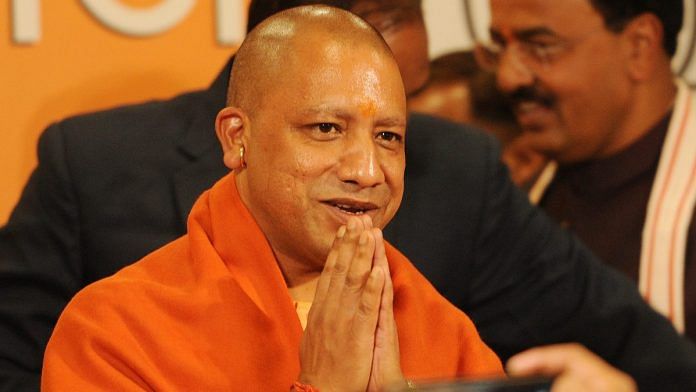The Samajwadi Party and the Bahujan Samaj Party, along with west UP’s Jat-led Rashtriya Lok Dal came together to form a mahagathbandhan. This ended, for the first time since the Babri Masjid fell in 1992, the competition for Muslim votes (the Congress was a factor for Muslim votes only in a handful constituencies such as Saharanpur).
This lack of competition for UP’s nearly 20 per cent Muslim votes meant that parties weren’t talking about Muslims, there was no discussion about who’s giving how many tickets to Muslims and where. No one was asking the question: which way are the Muslims going? They were going with the Yadavs and the Dalits, it was clear.
The political conversation was less about ‘dhruvikaran’ (polarisation) and more about ‘samikaran’ (caste equations) as the politically inclined got busy investigating whether the SP was able to transfer its votes to the BSP.
By coming together, the SP and the BSP tried to match the BJP’s formidable caste coalition. The SP-BSP alliance may or may not last after 23 May, but the two parties would do well to keep in mind that they have benefited not just by the lack of division of Muslim votes, but also by the lesser Hindu-Muslim polarisation. The lack of Hindu-Muslim polarisation dampens the Hindutva plank, making caste polarisation a bigger subject on the voter’s mind.
Also read: How Aligarh Muslim University has become a laboratory for religious polarisation
‘Green virus’
Not that the BJP didn’t try polarising. In the early days of the Lok Sabha election campaign, Uttar Pradesh chief minister Yogi Adityanath spoke in Bareilly: “You might have seen Rahul Gandhi’s nomination rally at one of the seats in Kerala, there was only greenery visible there. Congress flag was nowhere to be seen. Congress is suffering from this green virus, it has got infected by it.”
He didn’t say what he meant by ‘green virus’, but he was obviously referring to Muslims. He was also barred from campaigning by the Election Commission for three days for his Ali versus Bajrangbali remark in Meerut. Such a ban has become possible after the Supreme Court’s January 2017 order, which said that seeking votes on account of caste or religion will be deemed a “corrupt practice” under section 123(3) of The Representation of the People Act.
During the campaign, Adityanath made other such remarks, including calling the opposition “Babur ki aulad”.
Also read: In Uttar Pradesh, Dalits and Yadavs pretend they never hated each other
No big riot
For all these attempts, this Uttar Pradesh campaign saw remarkably less Hindu-Muslim polarisation than the 2017 Uttar Pradesh assembly election, or the 2014 Lok Sabha elections that were held in the aftermath of the Muzaffarnagar riots of 2013.
Local BJP leaders were all too happy to inflame passions during the Muzaffarnagar riots, but since Yogi Adityanath became the chief minister in 2017, there has been no big Hindu-Muslim riot in the state. Embers that emerge, as they did in Kasganj and Bulandshahr, were not allowed to flare up. We know that Hindu-Muslim riots escalate when the state wants them to escalate for political gains. But the Yogi government does not want to be blamed for poor law and order. It wants to be able to say, just like the Narendra Modi government in Gujarat after 2002, that it is not letting riots happen.
Perhaps the BJP felt it didn’t need much Hindu-Muslim polarisation this time around since it has achieved a similar political objective with the Balakot strikes, by showing a Hindutva government having gotten the better of Pakistan. And then it had the Modi factor in general, in itself acting as a polarisation: either you’re with Modi or against Modi.
Also read: BJP is emerging as second-most preferred political choice for Muslim voters in India
The vanishing maulana
After Yogi Adityanath became chief minister, UP’s Muslims have come to a collective understanding that they must practice silence. The maulanas and Muslims community leaders who used to speak on behalf of Muslims now refuse to give random ‘bites’ to TV cameras. Muslims say there’s no violence because they don’t respond to provocation anymore, silently swallowing daily humiliation and taunts. Even the maverick Azam Khan causes fewer controversies. He’s had to lose his headline-hunting addiction.
Secularists have good reason to lament the growing absence of Muslims from political discourse, but Muslims in UP don’t have this luxury. They are happy to not be a topic of conversation because when they are, it inevitably militates against them.
The collective and pragmatic silence is something Muslims across north India will today tell you about, and they have no ifs and buts about it. When the Muslim doesn’t even open his/her mouth, it becomes difficult for the BJP to portray him/her as an aggressor out to oppress the poor majority community.
Also read: Contrary to belief, Muslims listen to Ulema but not when it comes to their election fatwas




If there was no provocation from Maulanas it’s a good thing, least Muslims stop behaving like sheep and end up in the wolf’s mouth. To me the castist parties are wolf
Ye thik tha last wala chor ke
Ganja utar Gaya tera 😝😝😝😝
Hey Shivam how can BJP not win 543 out of some 400 they contested ?
Also, next time burnol will be available don’t worry
🤣🤣🤣🤣🤣🤣🤣